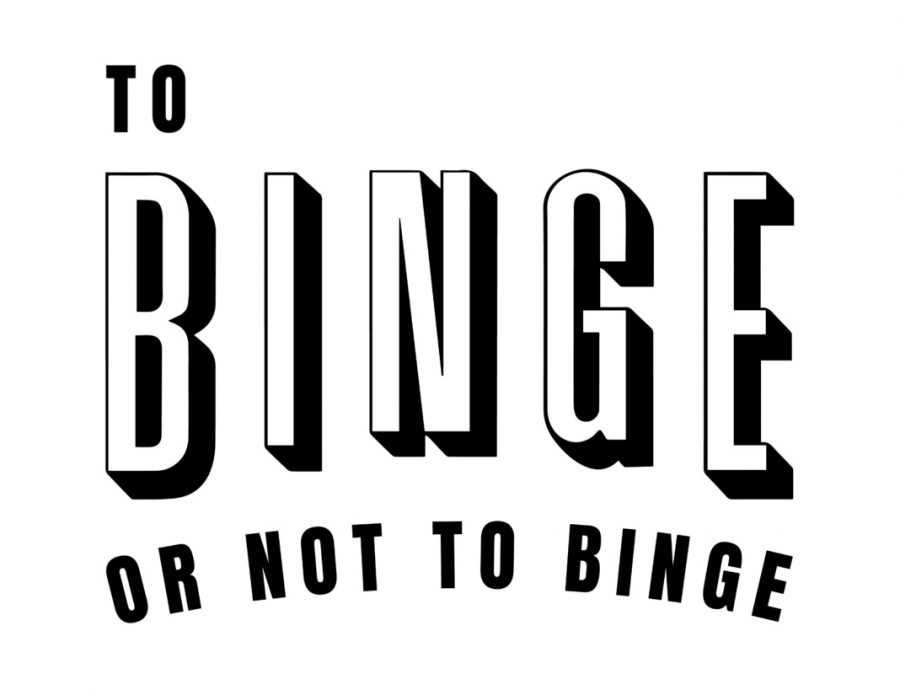To Binge or Not To Binge Episode 64: ‘Dear White People’
(Graphic by Hannah Allred | The Daily Utah Chronicle)
November 7, 2019
Deep into the semester, if I have time to breathe, let alone watch Netflix, I’m going to find a good, mind-numbing comedy to massage the brain. Unless I decide to watch a marginalized group of dynamic, Ivy League students also lose their minds over their own fictional semester.
In the hit-or-miss void of Netflix originals, “Dear White People” sets itself apart in its unrelenting boldness. It doesn’t shy away from political messages, but it also doesn’t use them simply to grab the audience. Discrimination, blackface parties, relationships across cultural identities — the show handles serious issues and situations by making them personal to the lives of each character. The show never fails to evolve its psychologically rich cast, never fails to give you something about them to hate and something utterly redeeming and honest to love.
“Dear White People” originated as a film by the same name by creator Justin Simien. The revived story centers around the members of Black Caucus, a gathering of several black advocacy groups. Although featuring a full-bodied cast, the show frames the series around Samantha White (Logan Browning), a biracial documentary film student at the fictional Winchester University. Her radio talk show gives the series its title and lays the groundwork for the themes around the series. It’s an audacious, honest show that gives voice to the black students on campus. Inspired by that idea, the first two seasons of “Dear White People” dedicate each episode to a single character. White’s character, although opinionated (even domineering at times), gives way to other students each exploring a different facet of the 21st-century zeitgeist. As compelling and intricate as White is, I also itch to watch Lionel Higgins’ (DeRon Horton) awkward development and Joelle Brooks’ (Ashley Blaine Featherson) and Reggie Green’s (Marque Richardson) nuanced ideas. There are no minor characters in “Dear White People.”
Season three does shift the established format, no longer focusing on individual characters in each episode or opening the episodes with a narrator. It’s the placement of the well timed comment “kill the narrator” at the beginning of season three that does indeed kill off the narrator. The characters, no longer mediated by the ironic, classical commentator, take up the mantle of their narratives. Their identities shift a lot, too. One thing you will never get from “Dear White People” is stagnancy, although you will get repeated jokes (refer again to episode one of season three).
To Binge or Not to Binge?
I’m tempted to tell you not to binge this — I dare you not to. Don’t let the five-second delay to the next episode trap you to another thirty-minute commitment, because this show is compulsively binge-able. The impulse to learn more about the characters doesn’t come from the writers goading you on with cliff-hangers, though. It comes at that moment when the character makes eye contact with the camera at the end of the episode. It comes from the brilliant handling of dialogue and tension and the desire to return to another realistically mosaic character. “Dear White People” does everything that I want to see on television. It’s a balance of commentary and comedy, colliding tension and satire. I’ll be over here, rocking in a corner, anxiously awaiting the fourth volume.
In this current liberal setting that many millennials resonate with and claim as their generation’s movement, there are questions of authenticity. To be truly progressive, you must hit the checklist to meet so many qualifications, support movements in the exact way that others do, repeat the dialogue rather than contribute to it. In a movement lost in a wave of provocative white noise, we don’t always allow for space within the new narrative. In some ways, we also need to kill our narrator and do a little deconstruction.
“Dear White People” shows a true range of both liberal thought and African American experiences. You see assertive challenging of assumptions through White and negotiated ideology in Coco Conners (Antoinette Robertson), who justifies certain behavior to progress as a black woman. Honestly, regardless of any preconceived ideas one might have going into this show, the characters’ positions are difficult not to empathize with. This show offers its share of hilarious moments, but it is critically relevant. The dual title, both the name of the series and the radio show, gives the show a meta edge while reminding white viewers constantly that we’re also part of a group that needs awareness.
Best Episode
“Season 2, Chapter VIII” — An episode that mainly takes place in the same room, it centers around Sam and her ex-boyfriend, Gabe (John Patrick Amedori), filming her for his documentary “Am I A Racist?” It integrates every emotion felt up to this point, bringing in all of the tension and beautifully crafted dialogue that you might find in a one-act play. It only looks at two characters, but the interplay between Browning and Amedori builds interest and blood pressure.
Similar Shows
“Jane the Virgin,” “Insecure,” “Atlanta,” “She’s Gotta Have It,” “Black-ish” and “One Day At A Time.”
Trigger Warning
Nope, totally clean. You could watch this comfortably with extended family. Especially if they’re comfortable with on-camera kazoo numbers. Did I say kazoo numbers? Sex — I meant sex.
“Dear White People”
5 out of 5 stars
Available on Netflix
30 episodes, 870 minutes (there are worse ways to spend a 14 hour day.)








